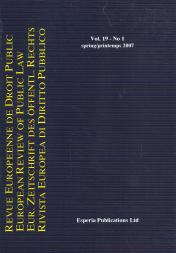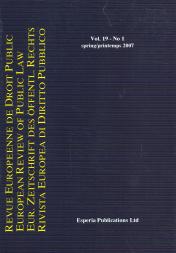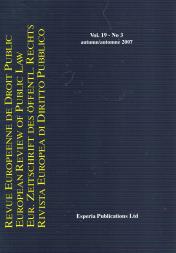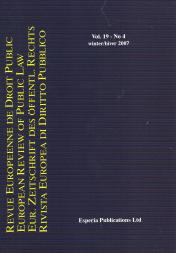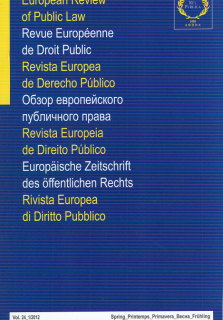
In this issue, are published the proceedings of the annual Conference of the EGPL organised from the 9th to the 11th of September 2011, on the subject “Public Law and the Judges”. Many prominent law scholars from all over Europe and the world participated in this Conference and contributed to the dialogue on the theme.
Under the heading “General Introduction. The Status of the Judge: Independence and Impartiality”, first an historical approach of the judge’s status during the long period beginning with the Middle Ages is provided on the way to reaching more current concerns. Then, the mechanisms and checks and balances through which impartiality and independence of adjudicators in international administrative tribunals may be protected are dealt with.
Finally, under this heading, a contribution focuses on the very qualities of independence and impartiality of the judge as far as three issues are concerned: the source and legal force of these two principles, content and scope and remedies.
Another heading is dealing with the theme of “Judicial Legitimacy - The Functions of the Judge”, under which a paper on the public standing and reputation of judges in the United Kingdom is published, while another paper maintains that in a multilevel constitutional system, like the European one, judicial legitimacy must also be multidimensional whereas international judges do not need such a high degree of legitimacy.
Under the heading “Judge-made Law”, a paper deals with the law-making power of the judge of the Union, who, just like the national judge, can be led to have a much wider role and to proceed to law-making, particularly in the framework of the interpretation of EU law, however under control of the legislature.
National reports follow this heading, coming from Austria, Bulgaria, Denmark, Greece, Ireland, The Netherlands, Poland, Serbia, Slovakia, Spain, Sweden and Turkey. These are based on a questionnaire elaborated on the theme “The Dialogue of the Judges - National Courts and European Courts”.
A Case Study is then presented focusing on the different forms of “the Dialogue of the Judges” and of the National Courts and the European Courts. In the two parts of this paper, first are analysed the forms of the direct dialogue of the judges and especially the nature and function of the preliminary rulings procedure and second, are pointed out the forms of the indirect dialogue of the judges. Finally, in this Case Study some other forms of cooperation between jurisdictions and judges are examined as well as the future of the indirect dialogue.
The Conclusions maintain that the jurists’ role is to examine the role of the judge in an uncompromising way, focusing not only on legal sources and procedures on the books but also on law in action as well as on the interaction between judges and other state agencies, since the judge is only one agent in public law.
In this same issue, are presented the speeches on the occasion of the Laudatio to Prof. S. Cassese (speeches by Professors G. della Cananea, E. Schmidt-Aßmann, L. Ortega, J.-B. Auby and Prof. S. Cassese’s Acknowledgements) and of the Laudatio to Prof. L. Martín-Retortillo (speeches by Professors M. P. Chiti, B. Pacteau, E. Malaret and Prof. L. Martín-Retortillo’s Acknowledgements).
Summary / Sommair
PART I / Ière PARTIE
FOREWORD / AVANT-PROPOS
General Introduction
The Status of the Judge: Independence and Impartiality /
Introduction générale: Le statut du juge: Indépendance et impartialité
• PH. NELIDOFF, L’évolution historique du statut des juges en France [IN FRENCH]
• A. GORDILLO, The Status of the Judge: Independence and Impartiality [IN ENGLISH]
• P. NIHOUL, L’indépendance et l’impartialité du juge [IN FRENCH]
Judicial Legitimacy - The Functions of the Judge /
La légitimité du juge - Les fonctions du juge
• SIR STEPHEN SEDLEY, Judicial Legitimacy: The Functions of the Judge [IN ENGLISH]
• A. M. GUERRA MARTINS, Judicial Legitimacy and the Functions of the Judge in a Multilevel Constitutional System [IN ENGLISH]
Judge-Made Law /
Le droit jurisprudentiel
• S. PAPASAVVAS, La création de droit par le juge de l’Union européenne [IN FRENCH]
Elements of Comparison /
Éléments de comparaison*
• A. LEHNER / T. MANTANIKA, “The Dialogue of the Judges” - Austrian and European Courts [IN ENGLISH]
• R. STEFANOV, “The Dialogue of the Judges” - National Courts and European Courts: Bulgaria [IN ENGLISH]
• J. E. RYTTER, Danish Courts and European Courts - Dialogue or Reluctance? [IN ENGLISH]
• V. KONDYLIS, “The Dialogue of the Judges” - National Courts and European Courts: Greece [IN ENGLISH]
• T. J. O’DOWD, The Judges and Public Law: Irish and European Perspectives [IN ENGLISH]
• T. VAN DEN BRINK, “The Dialogue of the Judges” - National Courts and European Courts: The Netherlands [IN ENGLISH]
• M. FLORCZAK-WĄTOR, “The Dialogue of the Judges” - National Courts and European Courts: Poland [IN ENGLISH]
• V. BEŠIREVIĆ / T. MARINKOVIĆ, Serbia in “a Europe of Rights”: The Effects of the Constitutional Dialogue between the Serbian and European Judges [IN ENGLISH]
• L. MOKRÁ / M. SIMAN, “The Dialogue of the Judges” - National Courts and European Courts: Slovak Republic [IN ENGLISH]
• A. BUENO ARMIJO / N. MAGALDI MENDAÑA / A. QUERALT JIMÉNEZ, “The Dialogue of the Judges” - National Courts and European Courts: Spain [IN ENGLISH]
• G. EDELSTAM, “The Dialogue of the Judges” - National Courts and European Courts: Sweden [IN ENGLISH]
• N. ARAT / A. TOPUKCU, General Assessment regarding the Relations of National and International Judges: Turkey [IN ENGLISH]
* For countries, regions, territories etc. the ERPL uses the names officially recognised by the UN / Pour des pays, régions, territoires etc. la REDP utilise les noms officiellement reconnus par les NU.
ANNEX, Questionnaire [IN ENGLISH]
Case Study /
Étude de cas
• V. KONDYLIS, “The Dialogue of the Judges” - National Courts and European Courts: Case Study [IN ENGLISH]
General Conclusions /
Conclusions générales
• A. REICHMAN, The Role of the Judge in Public Law: General Conclusions [IN ENGLISH]
PART II / IIère PARTIE
Laudatio: Prof. Sabino Cassese
• G. DELLA CANANEA, University of Rome “Tor Vergata” [IN ENGLISH]
• E. SCHMIDT-ASSMANN, Professor at the University of Heidelberg [IN ENGLISH]
• L. ORTEGA, Professor at the University Castilla-La Mancha (Toledo), Judge at the Spanish Constitutional Court [IN ENGLISH]
• J.-B. AUBY, Professeur de droit public, Directeur de la Chaire “Mutations de l’Action Publique et du Droit Public” (MADP), Sciences Po (Paris) [IN ENGLISH - FRENCH - ITALIAN]
• S. CASSESE, Emeritus Professor at the “Scuola Normale Superiore” in Pisa, Judge at the Constitutional Court of the Italian Republic [IN ENGLISH]
Laudatio: Prof. Lorenzo Martín-Retortillo
• M. P. CHITI, Professor at the University of Florence [IN ENGLISH]
• B. PACTEAU, agrégé de droit public et de science politique, professeur à l’Université Montesquieu Bordeaux IV, ancien professeur aux Universités de Clermont et de Poitiers, ancien judge ad hoc à la Cour européenne des droits de l’Homme [IN FRENCH]
• E. MALARET, Professeure à l’Université de Barcelone [IN FRENCH]
• L. MARTÍN-RETORTILLO, Professor at the Complutense University of Madrid [IN ENGLISH]
INFORMATIONS














